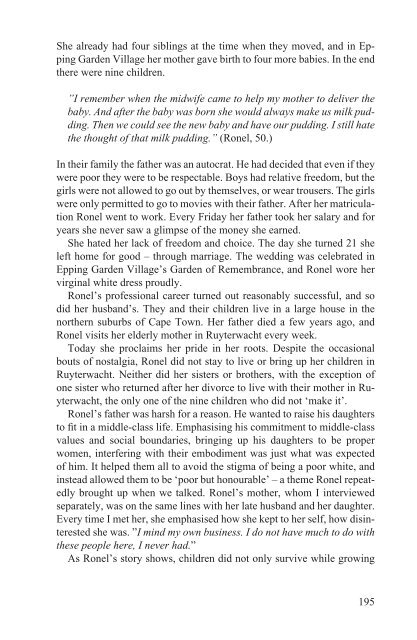The Making of a Good White - E-thesis - Helsinki.fi
The Making of a Good White - E-thesis - Helsinki.fi
The Making of a Good White - E-thesis - Helsinki.fi
Create successful ePaper yourself
Turn your PDF publications into a flip-book with our unique Google optimized e-Paper software.
She already had four siblings at the time when they moved, and in Epping<br />
Garden Village her mother gave birth to four more babies. In the end<br />
there were nine children.<br />
”I remember when the midwife came to help my mother to deliver the<br />
baby. And after the baby was born she would always make us milk pudding.<br />
<strong>The</strong>n we could see the new baby and have our pudding. I still hate<br />
the thought <strong>of</strong> that milk pudding.” (Ronel, 50.)<br />
In their family the father was an autocrat. He had decided that even if they<br />
were poor they were to be respectable. Boys had relative freedom, but the<br />
girls were not allowed to go out by themselves, or wear trousers. <strong>The</strong> girls<br />
were only permitted to go to movies with their father. After her matriculation<br />
Ronel went to work. Every Friday her father took her salary and for<br />
years she never saw a glimpse <strong>of</strong> the money she earned.<br />
She hated her lack <strong>of</strong> freedom and choice. <strong>The</strong> day she turned 21 she<br />
left home for good – through marriage. <strong>The</strong> wedding was celebrated in<br />
Epping Garden Village’s Garden <strong>of</strong> Remembrance, and Ronel wore her<br />
virginal white dress proudly.<br />
Ronel’s pr<strong>of</strong>essional career turned out reasonably successful, and so<br />
did her husband’s. <strong>The</strong>y and their children live in a large house in the<br />
northern suburbs <strong>of</strong> Cape Town. Her father died a few years ago, and<br />
Ronel visits her elderly mother in Ruyterwacht every week.<br />
Today she proclaims her pride in her roots. Despite the occasional<br />
bouts <strong>of</strong> nostalgia, Ronel did not stay to live or bring up her children in<br />
Ruyterwacht. Neither did her sisters or brothers, with the exception <strong>of</strong><br />
one sister who returned after her divorce to live with their mother in Ruyterwacht,<br />
the only one <strong>of</strong> the nine children who did not ‘make it’.<br />
Ronel’s father was harsh for a reason. He wanted to raise his daughters<br />
to <strong>fi</strong>t in a middle-class life. Emphasising his commitment to middle-class<br />
values and social boundaries, bringing up his daughters to be proper<br />
women, interfering with their embodiment was just what was expected<br />
<strong>of</strong> him. It helped them all to avoid the stigma <strong>of</strong> being a poor white, and<br />
instead allowed them to be ‘poor but honourable’ – a theme Ronel repeatedly<br />
brought up when we talked. Ronel’s mother, whom I interviewed<br />
separately, was on the same lines with her late husband and her daughter.<br />
Every time I met her, she emphasised how she kept to her self, how disinterested<br />
she was. ”I mind my own business. I do not have much to do with<br />
these people here, I never had.”<br />
As Ronel’s story shows, children did not only survive while growing<br />
195
















